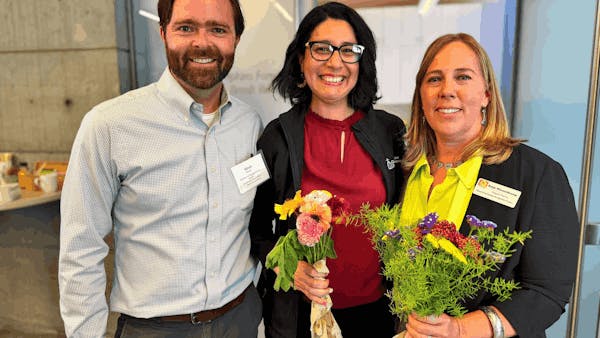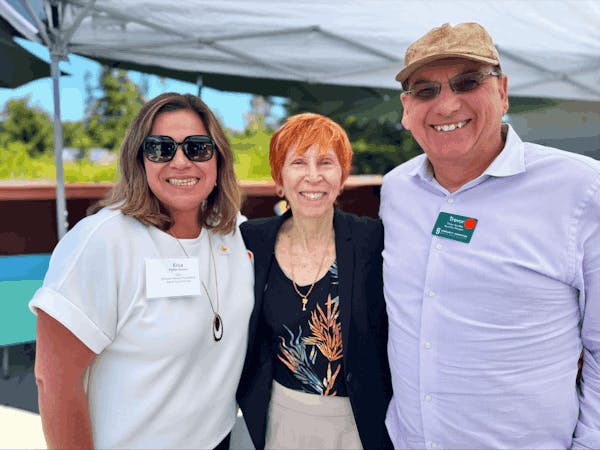
Trusted Leadership in Challenging Times
As new federal policies affect nonprofit programs and budgets across the nation, our community’s generosity and care is strong, and many are looking to help. Despite the fears that grip some of our most vulnerable neighbors, local leaders believe that our strength lies in our connections.
“People are thirsting to be in community,” said Angela Di Novella, Executive Director of Catholic Charities Diocese of Monterey during the recent “Giving to Meet Local Needs” event hosted by the Community Foundation.
Over 40 attendees came to learn about how to sustain Santa Cruz County nonprofits working to support immigrants, provide affordable health care and nutrition, and build an economy where everyone can thrive. Angela was part of the “Supporting Immigrants” panel discussion.
Angela emphasized the need for nonprofits to continue fostering trust. Recently, her organization held an information session for hundreds of concerned residents, showing the need for community outreach in trying circumstances.
Panelists were:
- Laura Marcus, Dientes Community Dental
- Erica Padilla-Chavez, Second Harvest Santa Cruz County
- Adriana Melgoza, Watsonville Law Center
- Catherine Stihler, Habitat for Humanity Monterey Bay
- Kate Hinnenkamp, Community Action Board/Santa Cruz County Immigration Project
- Angela DiNovella, Catholic Charities Monterey
- Anita Aguirre, Santa Cruz Community Health Centers
- ileana Ortega-Brunetti, Ventures
- Tina Cosentino, California Farmlink
The leaders shared their experiences with the attendees in honest exchanges. Erica Padilla-Chavez, the CEO of Second Harvest Santa Cruz County, said that her organization will have to continue adapting to waves of federal cuts.
“We are feeding 73,000 people a month and getting the food delivered to over 67 locations across the county every week. We're a lean machine. The name of the game for us is to monitor our operations so that we can continue to be lean and maximize opportunities,” Erica said. “If we can’t figure out how to nourish our hungry neighbors, then, as a community, we’re not going to be able to do anything else.”

Facing a New Reality with Decades of Experience
Laura Marcus, CEO of Dientes Community Dental, echoed Erica, saying her organization was building out contingency plans with the forecast of drastic cuts to Medicaid, including furloughing staff and closing clinics for an additional day per week, if necessary.
Despite the difficult reality these leaders are grappling with, they continue to rely on their organizations’ and their decades of experience, which are anchored in the trust they’ve earned from our community. Community Action Board celebrates their 60th anniversary this year; Santa Cruz Community Health Centers is turning 50; and Ventures is celebrating 35 years. Some leaders have risen through the ranks, and their journeys are entwined with their organization.
“I've been at this for a long time, almost 20 years,” Laura said. “We went through a big crisis in 2009 because the state of California eliminated adult dental benefits out of Medi-Cal at that time. We were quite small compared to today, and about 3,000 of our adult patients lost coverage, and we lost half of our budget. At the time, we had one clinic and only about 30 staff members, and we were able to quickly make up the million and a half dollars through fundraising. That's not going to happen this time.”
Despite mounting uncertainty, they are continuing to uphold our community’s values. While some leaders are adapting in real time and meeting basic needs, others are also looking towards the future.

Taking Action, Together
Attendees of the event were eager to get involved and many asked how they could make the best impact. In times when organizations are tightening operating budgets and cutting services, giving flexibly is paramount.
“Unrestricted funding is crucial,” said Adriana Melgoza, program director for Watsonville Law Center.
Leaders emphasized that the community can help in other, non-monetary ways too, including using our voices to advocate for local causes.
“If you think that your voice doesn't matter, we need to stop thinking that way, and we all need to pick up the phone or get on our email,” said Erica Padilla-Chavez.
We’ve put together an action list alongside our nonprofit partners with some steps you can take to help support your local nonprofits:
- Connect with local nonprofits by signing up for newsletters and following them on social media.
- Donate general operating support to these organizations through the Foundation’s Donor Portal or directly on the organization’s website.
- Consider volunteering or serving on a nonprofit’s committee or Board of Directors.
- Put your interest in one or more of these topics in your Memorandum of Charitable Intent (MOCI), a simple document we help you create that plans for future charitable gifts.
Header photo: CFSCC Director of Engagement and Impact Kevin Heuer (left), with Catholic Charities Executive Director Angela Di Novella and CAB Santa Cruz County Immigration Project Program Manager Kate Hinnenkamp.


